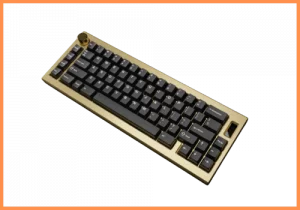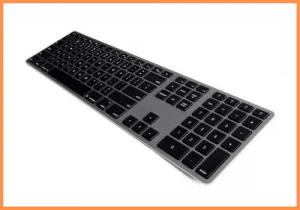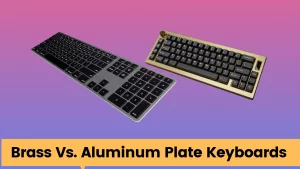When it comes to the customization and material selection of the keyboard, there are plenty of options available these days. The choice of brass vs aluminum plate keyboard material seems to have taken the enthusiast communities to debate which one is best for durability and functions.
Regarding keyboard customizations, switches and RGB are the top priority of gamers and enthusiasts. They are the significant components that people like to customize for a noticeable difference in performance and aesthetics. Among all the customizations, keyboard plates are the least talked about customization options among enthusiasts.
Different materials make the keyboard plates, including brass and aluminum. Both these materials are popular choices as they have both durable materials. With the ups and downsides associated with these materials, the final selection comes down to the individual’s choice of how he likes to feel and build the keyboard.
When comparing, brass has its strengths in sturdiness, density, rigidity, and low pitched sound. It is not one of the lightest materials for a keyboard material. In contrast, aluminum shows sturdiness, flexibility, and higher-pitched sound on the keypress. It means that you will get a soft and flexible feel compared to the brass keyboard plate.
That was an overview of keyboard brass vs aluminum plate. Let’s look at these materials and what value they add to the keyboard.
Click To See Content Of This Post
What is Brass Keyboard Plates?
Brass is a relatively new alternative to the classic aluminum keyboard plate. Many manufacturers are starting to offer this alluring material as an option for their mechanical keyboards. The reason for brass plates’ recent popularity is simple: these alternatives, produced from high grade, solid brass, have stylish touches and can improve typing performance, and will last longer than standard aluminum plates. The cost of a brass keyboard is higher than that of its aluminum counterpart because they are more elaborate and cost more to produce.
The keyboard plates in this category are heavier and stiffer, making them ideal for adding some resistance to your typing sessions. Of course, the rigidity may not appeal to everyone — those who write a lot might complain that it produces loud sounds when bottoming out. On the other hand, many people enjoy having loud-sounding keys as typists tend to be drawn to the auditory feedback accompanying heavy keystrokes.
It is a perception that one major disadvantage with brass plates is that Brass gets tarnished. You may be aware of the tarnishing problem if you have used anything made out of brass. However, there is one advantage to having a keyboard plate made of brass over other metals – and this is because they can survive longer than their weaker alternatives. You won’t hear any complaints about the brass keyboard plates as they are sturdier and more durable than alternatives.
Brass keyboard plates are susceptible to corrosion in the same way that brass doorknobs, locks, and other hardware are prone. Over time, they will grow darker and darker as they soak up oils from your skin and oxygen in the air. It can eventually cause you trouble if left unattended. That is why brass keyboards require more attention for maintenance and cleaning.
What is Aluminum Plate Keyboard?
There are several keyboard plate materials, with aluminum being the most common simply because it’s a budget-friendly option. However, this shouldn’t imply that aluminum is an inferior choice to other types of plates. It is a lightweight material choice for the keyboard plate and contributes to many manufactured keyboard units globally.
There is some ambiguity when it comes to the rigidity of aluminum plates. They are not entirely rigid and not as flexible as other materials employed in keyboard construction, like polymer or carbon fiber. However, they are not as dense as plates made out of brass or steel on the flip side. Because it’s so affordable and balanced between rigid and bendable, most keyboard manufacturers opt to incorporate aluminum into their product’s framework.
You probably wonder how to tell if your keyboard plate has aluminum. Well, an aluminum plate is noticeably more flexible than other materials like brass typically used for the construction of keyboard plates. As far as that higher-pitched sound goes, it’s much different from the sounds produced by other materials like brass. Recognizing your keyboard plate can get complicated if you have no idea what other keyboard plate material feels like.
When selecting a keyboard, it’s best to consider the material of the keyboard plate. It affects the feel of each keystroke, but your hands will also develop more fatigue with other materials, causing short-term discomfort and possibly long-term strain. Most keyboard plates have an aluminum composition, but some keyboards have brass plates.
Brass vs. Aluminum Plate Keyboards – Which One Is Better?
 To find the right keyboard plate for you, let’s first look at what each material has to offer, and then we will compare them into four main categories. It’s also important to remember that everyone will value certain factors differently when deciding this, so our goal here is to provide a helpful framework on which to base your choice. You can compare the materials based on their features and select the one that fits your budget and needs.
To find the right keyboard plate for you, let’s first look at what each material has to offer, and then we will compare them into four main categories. It’s also important to remember that everyone will value certain factors differently when deciding this, so our goal here is to provide a helpful framework on which to base your choice. You can compare the materials based on their features and select the one that fits your budget and needs.
Type and Feel
To start, we’d like to talk about flexibility, sound, and the feel of a keyboard. Brass plates are much more rigid than aluminum ones in terms of flexibility and feel. Because of their rigidity, it feels stiff when bottoming out. You can feel the flex and sound difference in the aluminum plates as it has moderate flexibility compared to the rigid brass plates. Heavy typists may feel the stiffness more than those who prefer light typing.
Even though it comes down to personal choice, we find that touch typists would enjoy working on an aluminum keyboard with a led back as it provides the best balance between being durable and light. Keyboards using brass plates tend to have deeper, low-pitched sounds if we talk about sound. If one is entirely focused and doesn’t care whether or not the keyboard can produce clacking sounds at higher speeds, aluminum keycaps are your best bet.
Lifespan
The brass plate is far from perfect compared to the aluminum plate, but it’s not a terrible option. When shopping for keyboard plates, you’ll want to look closely at how durable each is, as some aren’t as sturdy or long-lasting as others.
The brass plate may tarnish over time depending on how well you take care of it and keep it clean, but this should have little to no effect on your keyboard experience. Cleaning and taking care of your purchase will prolong its lifespan, so it’s well worth the extra effort in the long run.
Also Read: Wired Vs Wireless Keyboard
Sturdiness
Because brass is so dense, it’s more difficult to damage than aluminum, so it is much more durable. The flexibility of aluminum makes it prone to damage, while brass will look good no matter what kind of abuse you put it through or spill on it. If you want to ensure that your keyboard lasts a long time, the safest choice would be brass. It provides a rigid and durable plate for the keyboard that can bear any abuse you pass it through.
Affordability
Because a brass plate can be more expensive than other materials like aluminum, the price plays a factor in a consumer’s choice. Manufacturers often offer different options for their keyboards, and consumers who want to spend less will choose affordable keyboards that typically come with an aluminum plate. The price of the material and overall keyboard ranks aluminum as a top choice for keyboards by the manufacturers.
Brass vs Aluminum vs Polycarbonate Plate Keyboard
Each plate type has advantages and downsides for the users. If we create a comparison, it will be a long list. So we will summarize the difference between these plates in a few lines to save the hassle of reading long passages and comparing the specification of each material.
When we talk about the properties and performance of the brass plate keyboard, they are heavy, denser, and have stiffness. You may not like the keypress on a brass plate if you prefer light actuation and bottoming up of the keycap.
Aluminum is a flexible, affordable, and lightweight material. It is undoubtedly the most common material used in the keyboard plates due to its sturdiness and availability in many colors that add to the user experience.
The last material which is here for the discussion is Polycarbonate. The keyboard plates made of Polycarbonate are lightweight and inexpensive. Furthermore, they increase the keyboard’s aesthetics due to more vivid backlighting.
In short, selecting brass, aluminum, and polycarbonate plates is a personal decision. Depending on the usage, feel, and price, you can choose any material. Aluminum vs plastic keyboard plates is the hot debate among enthusiasts who like lightweight keyboards. However, brass is the top choice for people who want a loud keypress sound on actuation.
Is Brass or Aluminum Better for Keyboard Plate?
While the choice between aluminum and brass keyboard plates has been hotly debated for some time now, it turns out that both materials have their own set of significant advantages depending on your specific needs. When comparing brass or aluminum plate keyboard, the more expensive brass is more durable than aluminum. Still, the former can also be harder to maintain due to its tendency to stain or tarnish.
The sole reason aluminum plates or brass plates are priced differently is that they have varying manufacturing costs. With this in mind, pricing doesn’t necessarily reflect their quality level, so the best advice anyone can give you when choosing between the two is to weigh what they have to offer and decide which one you prefer from that perspective alone.
Do Brass Keyboard Plates Oxidize?
Keyboards can be a pain to maintain, especially if they come made out of different metals like brass. Anyone who has ever had one knows how tarnished they become after being in use. This process is called oxidation and is contributed by exposure to oxygen from the air. Alloys that hold a better oxidation resistance are used in making keyboards. The amount of oxidation usually relates to the alloy used in the brass.
A good thing about the tarnishing is that it only affects the upper layer of brass. It forms an oxidized layer on the brass and is far from the direct damage to the keyboard plate. Regular maintenance and proper care can minimize the oxidation and prevent permanent damage to the brass keyboard plate.
Final Words
Keyboard offers different types of customization for improving aesthetics and performance. Experimenting with the keycaps and RGB lights is one of the most common customizations. However, changing the keyboards plates is not something that is standard practice. Keyboard plates are solid characteristics that affect the feel and keypress sound during typing. Both these features are most noticeable in the mechanical keyboard. So, plate customization is something that enthusiasts may want to try with their keyboard.
Selecting between the keyboard plates is a matter of personal preference as both bras and aluminum are excellent for their durability and endurance. Brass is dense, strong, and provides a deep sound when a key bottoms out on the keyboard. It provides a stiff feel that heavy typers may not like as they offer minimal flexibility.
In contrast, aluminum is a material that is both durable and flexible. It provides a middle ground between light and dense plates. So choosing the aluminum plates is a matter of personal preference for those who like to have a flexible but light feel when the key registers a keystroke. Due to its availability and affordable price, aluminum keyboard plates are more common on keyboards.
Sources:





![Dell kb216 Keyboard Driver Error [SOLVED!]](https://kmgadvice.com/wp-content/uploads/2023/04/luca-bravo-XJXWbfSo2f0-unsplash-360x240.jpg.webp)